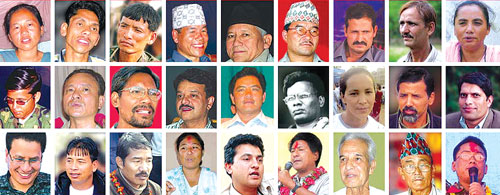The Maoist office in Old Baneswor is bustling. Outside there's barely enough parking space. The motorcycles and cars belong to the crowds of cadre and leaders, who can barely squeeze past each other in the narrow corridors inside.
The scene here looks like the office of a political party gearing up for an election.
You could call them the new faces of the new Nepal, and we should start getting used to them. One-third of the interim government's House of Representatives will consist of Maoist nominees and names put forth by the eight parties.
Maoist spokesperson Krishna Bahadur Mahara says that about 50 of their representatives will be chosen for their political qualities, and come from dalit, women, janajati, madhesi, and other oppressed groups, as well as the physically challenged, and the injured. Few were in active politics prior to 1996 and, in addition to the experience of armed rebellion, the new representatives will also bring with them new backgrounds, fresh perspectives, styles, and characters.

Mahara himself is most likely to get one of the five ministerial posts, and the rest will go to a mixed group that represents all the interest groups mentioned above.
The party will likely propose Deb Gurung for the post of Speaker of the interim parliament. If this does not happen, Gurung and Matrika Yadab will join Mahara as ministers. Either Hisila Yami or Pampha Bhusal, and 'People's Liberation Army' Deputy Commander Nanda Kishore Pun ('Pasang') are also likely to join the government.
Four high-level leaders-Pushpa Kamal Dahal, Baburam Bhattarai, Ram Bahadur Thapa, and Post Bahadur Bogati-along with most other central committee members will not join the interim government or parliament. Mahara said this was because, "The leadership level will be working on spreading the organisation in view of the constituent assembly elections."
Senior Maoist leaders Thapa, Bogati, Barsha Man Pun ('Ananta'), and Deb Gurung are working on changing the 'wartime' structure of the organisation, and preparing a proposed list of representatives. Deputy Commanders Pasang, Chandra Khanal ('Baldev'), Janardan Sharma ('Prabhakar'), and central committee member Kul Bahadur KC will manage the Maoist army and work simultaneously on who will join the planned integrated national army and at what position.
In addition to the commissars, the Maoists are expected to bring in upper-level leaders from sister organisations, civil society, and independent communities.
Sources tell us that anyone who agrees with the Maoists' republican agenda could be given a post-even if they are independents or currently members of the Congress, the UML, or any other party. "We don't have to join the government to send people from outside," said Mahara, "Can't we give constructive criticism anyway?"
According to the SPA-Maoist agreement, two-thirds of the 330 members of the interim parliament will be pre-1999 representatives. In the interim period there will only be one House, with the the 209 former representatives coming together from the previous Upper and Lower Houses. Many will have been elected during the last election, in which the Maoists did not, of course, participate. Of the other 121 seats, the Maoists will get 73, while the remaining 48 members will be nominated by the eight parties from representative professional organisations, oppressed peoples and regions, and other political figures.


